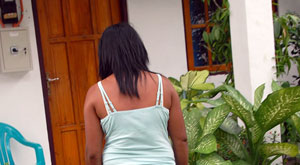East Timor used to be a lonely place for anybody seeking refuge from domestic violence. Statistics from the government's Demographic and Health Survey of 2010 showed that only one in four women can rely on family members to provide shelter for a few nights if needed, and even less – one in five Timorese women - could rely on their families to financially support them.
Thankfully this situation is improving. With Australian support, the Government of East Timor is more than half way through rolling out a network of Safe Houses in major cities and towns across the country. Known locally as Fatin Hakmatek, the Safe Houses provide victims of domestic violence with secure overnight accommodation, counselling, medical treatment and ongoing referrals.
In mid-September, Australia's Ambassador for Women and Girls, Penny Williams, formally opened an AusAID-funded Safe House in the town of Suai – the largest population centre on East Timor's southern coast. Like all other Fatin Hakmatek in East Timor, the Safe House in Suai is located next to the District hospital and is managed by PRADET, a Timorese NGO specialising in helping people deal with trauma, grief, sexual assault and domestic violence.
According to the Director of PRADET, Manuel dos Santos, a Fatin Hakmatek is the first stop for anyone needing help to escape domestic violence. 'People who come to the house are able to stay for a few days and if they aren't able to return home, we help them find alternative accommodation.'
'For the first time, Timorese now have a secure place to turn to' says Manuel. 'If they have been injured as a result of violence they might also be referred directly from the hospital. When they arrive at a Fatin Hakmatek, our midwives and nurses care for them and offer them counselling as well as practical things like clothes and food.' Safe Houses also provide forensic documentation of injuries and ongoing referrals for victims to pursue justice through the courts.
Improving community awareness
Sadly, levels of domestic violence against women remain high in East Timor. The Demographic and Health Survey found that over one-in-three women had experienced at least one case of physical violence since the age of 15. In Dili, that figure rose to one-in-two.
Despite its prevalence, domestic violence continues to go under-reported. Manuel says East Timor's history of conflict, poverty and cultural prejudices explain the high levels of violence against women. Many Timorese regard domestic violence as a private matter among families and are reluctant to raise it. 'So entrenched is domestic violence in Timorese society that many women themselves think violence is justified in certain situations' he says.
According to the Demographic and Health Survey, more women than men think wife-beating is acceptable if a woman goes out without telling her husband. Changing this mindset is a priority for PRADET which delivers counselling and information sessions to ensure that both men and women understand the seriousness of domestic violence.
'With support from AusAID, we are helping to raise awareness that violence against women should not be tolerated under any circumstance.'
Australia is supporting civil society organisations and the Government of East Timor to raise awareness of domestic violence and support victims. Our assistance has supported the construction and ongoing operating costs of Safe Houses in Oe-Cussi, Maliana and Suai, as well as meeting the operating costs of the Safe House in Dili. Two more Safe Houses are planned for Maubisse and Baucau in the coming year.
AusAID and the Australian Federal Police have also helped PRADET develop a unique Medical Forensic Protocol for examining victims of violence and assault who come to the safe houses. The way in which the information is collected means it can be drawn on as evidence by police or prosecutors for use in court.
'We work closely with the communities and with the police to let people know that Fatin Hakmatek are there to support people who need it' says Manuel. 'We also train community members on issues related to domestic violence and encourage people to speak up if they are victims of violence. If we hear that someone in a remote area needs to come to a Safe House but for some reason can't reach us, we go and collect them.'
East Timor enacted domestic violence legislation in 2010. Australia is working with Timorese NGOs to provide legal services to victims of domestic violence, sexual assault, and child abuse in courts in four districts. Australia is also funding public information programs about domestic violence and increasing awareness through youth theatre, short films and radio.
More information
More about AusAID's support for the elimination of violence against women in East Timor
More about PRADET [external website]

